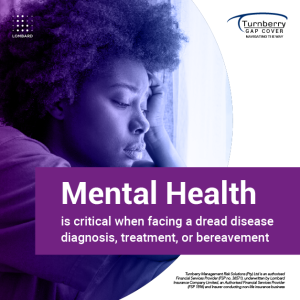
BizCommunity – 17th April 2023
A diagnosis of cancer or another dread disease is a devastating blow, not only for the patient but for their family and loved ones. The diagnosis itself, the trauma of going through treatments and the bereavement of losing someone all take their toll on mental wellbeing.
Depression, anxiety, and mental illness frequently go hand in hand with physical illnesses like cancer. It is an isolating experience, and often people struggle through these feelings alone, but this does not have to be the case.
There is help available with programmes designed to support families on the cancer journey. There is also financial support available from elements such as gap cover, where value-added benefits may cover items like trauma counselling, which can be a lifeline in times of great need.
Looking after your mental health is essential, both for fighting disease and coping with the trauma of diagnosis and subsequent loss.
Support for patients and families
Sound mental health is absolutely critical, both for patients fighting cancer and for families who are on this journey with a loved one or have already experienced a loss.
Especially when a diagnosis or a loss is sudden and unexpected, feelings of anger, grief, frustration and guilt are common, and all of these emotions come into play at various stages, often in waves. We often feel the need to be strong, which typically involves locking our feelings away, but this frequently leads to mental health issues like depression and anxiety, and feelings of being overwhelmed.
There is also a persisting perception that seeking help means you are weak, but nothing could be further from the truth. Mental strength is essential in fighting diseases like cancer, and developing this strength requires support.
Professional help can be hugely valuable in helping you to process grief and give you the tools you need to deal with challenges in a constructive way, whether you have lost a loved one, are going through treatment, or have someone close to you who has received a diagnosis.
However, often the cost of this can put people off, especially when they are already facing potential medical-expense shortfalls relating to cancer treatments.
This is where gap cover is essential. Not only does gap cover give you peace of mind that many of these shortfalls will be covered, but certain providers also have value-added benefits.
Providing peace of mind
Knowing that care is available and that finances will not be a hurdle in receiving the treatment you or a loved one needs, whether for physical or mental health, can significantly reduce the massive stress that critical illness and dread disease create. This then gives more freedom to focus on fighting the disease itself, rather than worrying about paying for treatments.
The best advice I can give people is to make sure they have the options available to explore, to make better choices that can lead to better outcomes. Having gap cover in place facilitates many more choices, but people need to be open to asking for and receiving help, especially when it comes to mental wellbeing.
Asking for help is not a sign of weakness, and there is help available. Reach out, get as much information as you can, and take advantage of what is there and available. You do not have to walk this journey alone.
https://www.bizcommunity.com/Article/196/336/237690.html
Evy Michalopoulos is the founder and chief executive officer of Machi Filotimo Cancer Project, a non-profit organisation that raises awareness about cancer, its symptoms and treatment, and helps to guide cancer patients and their families as they navigate this difficult journey.
https://getcovered.turnberry.co.za/app/1
What is Gap Cover?
https://getcovered.turnberry.co.za/app/1
Client Testimonials
I have been a Turnberry Management Risk Solutions customer since 2016, after my financial advisor encouraged me to take out a gap cover plan to bolster my medical aid hospital plan. My plan gives me up to 600% cover for medical scheme shortfalls, which was a real blessing when I was diagnosed with a double pulmonary embolism in August 2020. I was in hospital for five days and saw numerous doctors. I had many tests done including x-rays, CT scans and MRIs. When I was discharged, the bills started to arrive, and each doctor had shortfalls that my hospital plan would not cover. Luckily, I had gap cover in place, and Turnberry took care of these shortfalls so that I could focus on my recovery. This was the first time I had claimed from my gap cover, but the relief of knowing that I had cover took away a lot of stress. My broker took me through the process and once I submitted all of the required documents, the claim was assessed and paid out within a few days. I then had to have a follow-up MRI with a co-payment which was not covered by my medical aid, and Turnberry again came to my aid. Going from healthy to hospitalised is not something you expect, but in reality, it can happen to anyone, and the last thing on your mind is how you will pay for the bills. I learned this the hard way when my mother was diagnosed with cancer and did not have medical aid or gap cover, and the financial pressure of trying to fund her treatment was enormous. This is a burden nobody should have to deal with, which is why gap cover is absolutely essential.
Evy Michalopoulos, Founder & CEO of the Machi Filotimo Cancer Project – November 2021
